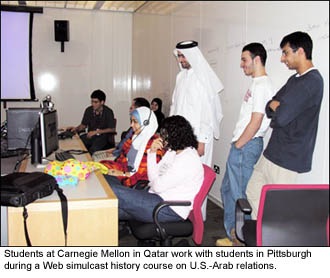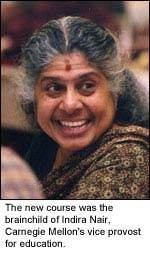Imagine a course on current events that students in the Middle East and the United States could take at the same time. Carnegie Mellon is making it happen with an innovative history course on U.S.-Arab relations that is being taught on the university’s Pittsburgh and Doha campuses via Web simulcast.

The idea for such a course came to Indira Nair, vice provost for education and professor of engineering and public policy, after she learned of a Web-based discussion forum, offered by the Boston-based company Soliyah, which was being used by several American and Middle East universities.
“This got me thinking about how we could connect our students on two continents,” Nair said. “Two faculty members, Dr. Laurie Eisenberg and Dr. Ben Reilly, then developed the course to bring students together in direct dialog about American and Arab relations.”
Professors Eisenberg and Reilly, from the Pittsburgh and Doha campuses respectively, have worked together to overcome the distance obstacles and create a seamless classroom experience for the students. Via theater-sized video screens, students in classrooms in Pittsburgh and Doha discuss materials at the same time. Challenges in teaching the course include a time difference and the complication of holding a late afternoon class during Ramadan in the Middle East, a time when most people will be focused on Iftar, the meal that breaks the fast. All involved agreed—the benefits of direct discussion of current events within an historical context outweighed the challenges.
“In the aftermath of the horrible events of September 11 and the bitter controversy created by the second Iraq War, there is a greater need than ever before for a direct dialog between young American and Arab students,” Reilly said.

The Web forum is being offered to universities in the United States, Egypt, Lebanon, Jordan and the Palestinian Authority through Soliya’s Connect program. Using an ordinary Web camera, students participate in Internet-based chats. The chats augment the classroom exploration of American and Arab history, international relations, conflict resolution and media studies. As part of the Web forum, the group writes an op-ed and evaluates broadcast news footage from the BBC, Al Jazeera and MSNBC.
“I am tremendously excited to embark on this course because it gives our students the solid historical background that they need to discuss directly, intelligently and meaningfully the very important issues currently at play in U.S.-Arab relations,” Eisenberg said.
Cross registration in Doha’s Education City brought students from Texas A&M and Virginia Commonwealth to Carnegie Mellon’s Qatar campus to participate in the course.
“This is a wonderful course to pioneer cross-registration. We are very happy to work with the Qatar Foundation and our sister campuses to broaden the educational experience for all students at Education City,” said Charles Thorpe, dean of Carnegie Mellon in Qatar.
Reilly says it’s basic to the mission of the course to bring together a diverse group of students. The course has two goals: To enable the students to express their feelings on issues of personal relevance, and to inform those views by examining recent scholarship by some of the best authors working today in the field of U.S. –Arab relations.
“It is my hope that such experiences will build shared understanding, and shared visions for peace among young peoples of conflicted nations; that they, as future leaders, will build bridges that offer possibilities for dialogs and compassionate compromises rather than violence and blind dogma to settle differences,” Nair said.
Related Links:
Carnegie Mellon in Qatar
Laurie Eisenberg
Indira Nair



